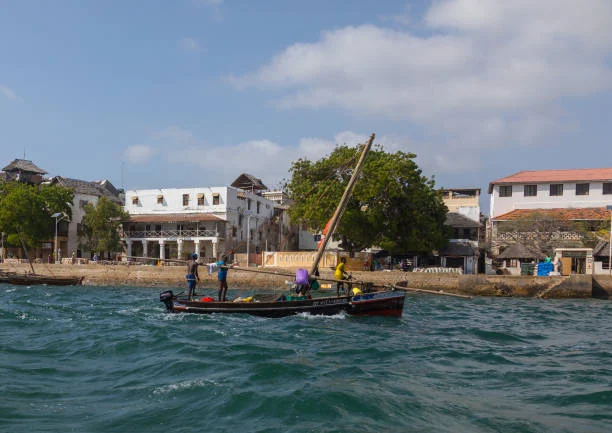African World Heritage Day | Significance, History, Facts
African World Heritage Day
 |
| Zulu woman in traditional red headdress of a married woman with her children. Beehive hut in the background. Lesedi Cultural Village near Johannesburg, South Africa(Getty) |
Every year on May 5th, people celebrate African World Heritage Day to promote the importance of preserving and safeguarding African cultural and natural heritage sites. This day serves as a reminder of the exceptional universal significance of these sites and the role they play in the world's cultural and natural heritage.
In 2015, the African World Heritage Fund (AWHF) launched the observance of African World Heritage Day, which has since been recognized as an official commemoration by the African Union. The theme of this day changes annually, highlighting various aspects of African heritage.
 |
| Traditional Burundian drummers perform the royal drum dance during the national drummer contest in Gitega, Burundi(Getty) |
African World Heritage Day provides an opportunity to appreciate the value of African heritage and encourage everyone to take part in its conservation. It also acknowledges the challenges that African heritage sites face, including climate change, human conflict, and inadequate management, and aims to find sustainable solutions to these issues.
What is the significance of the African World Heritage Day?
The significance of the African World Heritage Day lies in its role in promoting the preservation and protection of African cultural and natural heritage sites. This day serves as a reminder of the outstanding universal value of these sites and their contributions to the world's cultural and natural heritage.
 |
| Three Maasai Warriors Jumping(Getty) |
African World Heritage Day provides an opportunity to raise awareness about the importance of conserving African heritage, which is critical for the continent's socio-economic development, identity, and cultural diversity. It also offers a platform for recognizing the challenges facing African heritage sites, such as climate change, human conflict, and inadequate management.
By celebrating African World Heritage Day, people can appreciate the value of African heritage and the need for its protection. It also encourages people to take an active role in preserving African heritage sites, which will contribute to sustainable development, the promotion of peace and social cohesion, and the realization of cultural rights for all people.
What are the heritage places in Africa?
Africa is home to many heritage places that are of cultural and historical significance. Some examples of these heritage places include:
Pyramids of Giza in Egypt
 |
| People ride on carriages past the pyramids of Khufu (Cheops) at the Giza pyramids necropolis on the southwestern outskirts of the Egyptian capital Cairo(Getty) |
Timbuktu in Mali
 |
| Mosque, Tombouctou, Mali(Getty) |
Stone Town in Zanzibar, Tanzania
 |
| Bird's eye view of the rooftops of Stone Town during sunrise. Stone Town, Zanzibar.(Getty) |
Lalibela in Ethiopia
 |
| The monolithic church of Saint George, one of the most famous in Lalibela, Ethiopia(Getty) |
Robben Island in South Africa
 |
| The buildings of the abandoned prison on Robben Island,now listed as a World heritage site.(Getty) |
Djenné in Mali
 |
| The mosque of Djenné is the biggest adobe style monument in the world(Getty) |
Aksum in Ethiopia
 |
| Aksum, Tigray, Ethiopia, East Africa, Africa(Getty) |
The Great Zimbabwe in Zimbabwe
 |
| Panorama of the ruins and the large enclosure of Great Zimbabwe((Getty) |
Leptis Magna in Libya
 |
| The theater at Leptis Magna, considered to be the finest Roman ruin in the Mediterranean, in Libya.(Getty) |
The Old Towns of Agadez and Zinder in Niger
 |
| Niger, Agadez, Door of the desert, The Great Mosque build of mud, 16 century(Getty) |
The Koutammakou landscape in Togo
 |
| Batammariba people in Koutammakou region, inscribed on the World Heritage(Getty) |
The Cape Coast Castle in Ghana
 |
| A general view of the Cape Coast Castle in Cape Coast, Ghana(Getty) |
The Matobo Hills in Zimbabwe

Granitic rocks in the surrounding area, Bulawayo, Matobo Hills(Getty)
The Ngorongoro Conservation Area in Tanzania

Rhino, Springboks, zebra, Elephant and lion in Serengeti National Park, Tanzania.(Getty)
The Old Town of Lamu in Kenya.

A dhow passng in front of the old town, Lamu County, Lamu Town, Kenya(Getty)
These are just a few examples of the many heritage places in Africa. Each of these sites has unique cultural, historical, and natural value and has contributed significantly to the continent's rich and diverse heritage.
African heritage history
The history of African heritage can be traced back to ancient times, where the continent was home to numerous kingdoms, empires, and civilizations, each with its unique culture, language, and traditions. These included the Kingdom of Kush, the Kingdom of Aksum, the Mali Empire, and the Great Zimbabwe, among others.
The continent was also a significant hub of trade, with goods, ideas, and cultures exchanged between the different regions and peoples. The spread of Islam and Christianity to Africa also influenced the continent's culture and identity.
However, the transatlantic slave trade, which began in the 15th century, had a significant impact on African heritage. Millions of Africans were forcefully taken from their homes and transported to the Americas, where their cultural traditions and identities were stripped away.
In the late 19th century, European colonialism further eroded African heritage, as the colonizers imposed their culture, language, and values on the continent. This led to the destruction of many African cultural and historical sites and the loss of knowledge about the continent's heritage.
Since the mid-20th century, efforts have been made to preserve and promote African heritage. The establishment of UNESCO's World Heritage Sites program and the African World Heritage Fund have been critical in preserving and safeguarding the continent's heritage. Today, African heritage continues to evolve, with new traditions and practices emerging, and efforts being made to ensure that the continent's rich and diverse cultural and natural heritage is preserved for future generations.



.jpeg)
